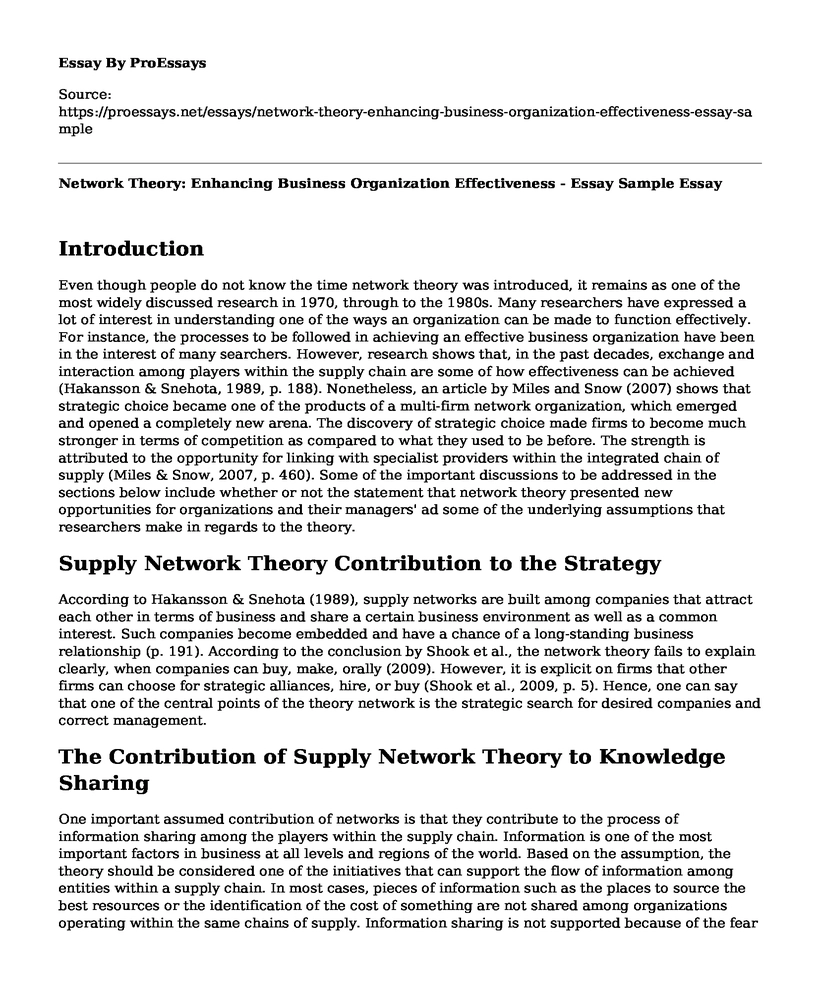Introduction
Even though people do not know the time network theory was introduced, it remains as one of the most widely discussed research in 1970, through to the 1980s. Many researchers have expressed a lot of interest in understanding one of the ways an organization can be made to function effectively. For instance, the processes to be followed in achieving an effective business organization have been in the interest of many searchers. However, research shows that, in the past decades, exchange and interaction among players within the supply chain are some of how effectiveness can be achieved (Hakansson & Snehota, 1989, p. 188). Nonetheless, an article by Miles and Snow (2007) shows that strategic choice became one of the products of a multi-firm network organization, which emerged and opened a completely new arena. The discovery of strategic choice made firms to become much stronger in terms of competition as compared to what they used to be before. The strength is attributed to the opportunity for linking with specialist providers within the integrated chain of supply (Miles & Snow, 2007, p. 460). Some of the important discussions to be addressed in the sections below include whether or not the statement that network theory presented new opportunities for organizations and their managers' ad some of the underlying assumptions that researchers make in regards to the theory.
Supply Network Theory Contribution to the Strategy
According to Hakansson & Snehota (1989), supply networks are built among companies that attract each other in terms of business and share a certain business environment as well as a common interest. Such companies become embedded and have a chance of a long-standing business relationship (p. 191). According to the conclusion by Shook et al., the network theory fails to explain clearly, when companies can buy, make, orally (2009). However, it is explicit on firms that other firms can choose for strategic alliances, hire, or buy (Shook et al., 2009, p. 5). Hence, one can say that one of the central points of the theory network is the strategic search for desired companies and correct management.
The Contribution of Supply Network Theory to Knowledge Sharing
One important assumed contribution of networks is that they contribute to the process of information sharing among the players within the supply chain. Information is one of the most important factors in business at all levels and regions of the world. Based on the assumption, the theory should be considered one of the initiatives that can support the flow of information among entities within a supply chain. In most cases, pieces of information such as the places to source the best resources or the identification of the cost of something are not shared among organizations operating within the same chains of supply. Information sharing is not supported because of the fear that the competitors could use such vital pieces of information in their favor Ballou, Gilbert, & Mukherjee, 2000, p. 17). Another fear comes from the fact that companies have their unique additional efforts to help the business grow when they share such insights with managers who might be interested in data poaching, such a company can easily lose its competitive ability (Lamming et al., 2000, p. 681). Conclusively, Zaheer et al. explain that open information-sharing network help boost business through the provision of learning potential (2000). Besides, strategic networks share some pieces of information such as markets, technologies, and resources; hence, it makes it possible for companies to underhand and meet strategic objectives such as outsourcing the stages of value chain, sharing risks, and functions of an organization (Zaheer et al., 2000, p. 203).
References
Hearnshaw, E. J., & Wilson, M. M. (2013). A complex network approach to supply chain network theory. International Journal of Operations & Production Management, 33(4), 442-469.
Pathak, S. D., Day, J. M., Nair, A., Sawaya, W. J., & Kristal, M. M. (2007). Complexity and adaptivity in supply networks: Building supply network theory using a complex adaptive systems perspective. Decision Sciences, 38(4), 547-580.
Sih, A., Hanser, S. F., & McHugh, K. A. (2009). Social network theory: new insights and issues for behavioral ecologists. Behavioral Ecology and Sociobiology, 63(7), 975-988.
Cite this page
Network Theory: Enhancing Business Organization Effectiveness - Essay Sample. (2023, Feb 16). Retrieved from https://proessays.net/essays/network-theory-enhancing-business-organization-effectiveness-essay-sample
If you are the original author of this essay and no longer wish to have it published on the ProEssays website, please click below to request its removal:
- Sources of Innovative Opportunities Essay
- Analysis of an Entrepreneur: Naomi Simson
- Cascade Camping Advertisement Ratings - Letter Example
- 1982 Tylenol Crisis: Johnson & Johnson's Fight for Survival - Essay Sample
- Group Dynamics: Key to Achieving Diversity, Productivity & Quality in Organizations - Essay Sample
- Essay Example on Launch New Cinema App: Reach Your Target Audience Effectively
- Essay Sample on Online Marketing: Utilizing Social Media to Reach Global Audience







